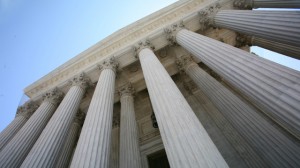Every week Moyers & Company producer Gail Ablow shares her must-read money and politics stories.
The moment that Supreme Court watchers had anticipated finally arrived Wednesday, as the Supreme Court struck down “aggregate limits” on political contributions in a 5-4 ruling in McCutcheon v. FEC.For a revealing glimpse of the legal drama, read this –> “A civil day on the bench for opinions on the impolite world of campaign finance” by Mark Walsh of Scotusblog.com, who was in the courtroom yesterday morning and relates Chief Justice Roberts’ reading of the decision. “Money in politics may seem repugnant to some, but so too does much of what the First Amendment vigorously protects,” Roberts said. “If the First Amendment protects flag burning, funeral protests and Nazi parades — despite the profound offense such spectacles cause — it surely protects political campaign speech despite popular opposition.” Walsh concludes with a glimpse of Justice Breyer summarizing the dissent in a tone that is “steely” but not angry:
‘Today the Court overrules Buckley and strikes down a similar ceiling [on overall contributions] as unconstitutional…The Court substitutes for the current two-year overall contribution ceiling of $123,000, the number infinity.’
He pauses and a few people chuckle at that. ‘If the Court in Citizens United opened a door, today’s decision may well open a floodgate.’
Die another day: Supreme Court takes a big step closer to gutting the last bits of campaign finance reform –> Rick Hasen, UC-Irvine law professor and founder of the Election Law blog, writes at Slate.com that he expected the government to lose, but this “subtly awful decision” portends “a raft of new First Amendment attacks on soft money and even on the basic limits on how much individuals can give candidates for office.” Roberts is “playing the long game,” he writes, and despite any assurances, Hasen predicts that the base limit of $2,600 per candidate is doomed. He highlights three parts of the decision that he thinks will set the course for future challenges: 1) “the very stingy” definition of corruption 2) the tightened “exacting scrutiny” standard, and 3) the rejection of ingratiation and access as a problem. Hasen writes that number three “seems to open the door to a challenge of what remains of the McCain-Feingold law: the ban on ‘soft money’ contributions collected by political parties.”
Legalized corruption and the twilight of campaign-finance law –> On The Atlantic website, Garrett Epps, a constitutional law scholar and former reporter for The Washington Post, calls McCutcheon an “execrable” decision. He observes that like Buckley v. Valeo (1976) before it, McCutcheon removes “any consideration of civic equality, or of a right to be heard as well as to speak, from the ongoing debate about money in politics.” Writes Epps, “All of which means, in effect, that the more money flowing through the system the better. Those who, from lack of money, are muted or excluded from the process are simply losers in a fair democratic system.” As far as the Court is concerned, the only legitimate reason for campaign finance regulation is to prevent overt quid pro quo corruption. Epps concludes:
“Here is the airless loop of right-wing campaign-finance ideology: Contributions of money are just support, like volunteering to lick stamps at the campaign office; reclusive Nevada billionaires are just constituents, like the widow seeking her pension benefits; the desires of business executives are just beliefs, advanced in the way the Founding Fathers wanted — by writing big checks. Under this rationale, it is hard to see why direct-contribution limits should be allowed, and we may assume that cases soon to be brought will give the majority the chance to eviscerate those limits.”
Larry Lessig also delves into the meaning of corruption in his piece for The Daily Beast, “Originalists making it up again: McCutcheon and corruption,” and concludes that the McCutcheon decision hinges on a dangerously narrow definition that the Framers themselves wouldn’t recognize. He writes:
Building upon the work of Zephyr Teachout, two researchers and I scoured every document that we could from the framing of our constitution to try to map how the Framers used the word “corruption.” What was absolutely clear from that research was that by “corruption,” the Framers certainly did not mean quid pro quo corruption alone. That exclusive usage is completely modern. And while there were cases where by “corruption” the Framers plainly meant quid pro quo corruption, these cases were the exception.
The Supreme Court’s ideology: More money, less voting –> The McCutcheon decision will help the dollar kill the vote, warns two reporters at The Nation. Ari Berman writes that the Roberts Court has “made it far easier to buy an election and far harder to vote in one.” The same billionaires who are pouring money into elections are funding the efforts to make voting more difficult for groups that aren’t in lockstep with their views. “The Court’s conservative majority believes that the First Amendment gives wealthy donors and powerful corporations the carte blanche right to buy an election but that the Fifteenth Amendment does not give Americans the right to vote free of racial discrimination,” writes Berman.
John Nichols continues this theme in his article, “With McCutcheon ruling, an activist Court opts for full-on plutocracy.” The Supreme Court’s decision will do even more destruction than overturn 40 years of campaign finance law, he writes, “The court has opted for full-on plutocracy — and it is unimaginable that the five justices who make up the court majority on these issues will stop here.”
SCOTUS on money and politics: A reader’s guide –> Kenneth Vogel, writing for Politico.com thinks that it may be too hasty to call this decision a “game-changer that will open a gusher of new money into politics.” He writes that there are still plenty of laws and rules on the books that can control the flow of money and he outlines some of them: 1) The amount of money that can be given to any one candidate or party committee is still capped. 2) It remains unclear (and dependent on the FEC and lawyers) how much an individual can give, in total, under McCutcheon. 3) Donations to candidates and parties must still be disclosed. 4) McCutcheon doesn’t allow unlimited donations to candidates or groups, nor does it allow corporations or unions to donate to campaigns or parties.
Best democracy money can buy –> “Who wants to marry a billionaire?” the blogger Digby asks in a recent post lambasting the parade of potential GOP presidential candidates trying to kiss up to Sheldon Adelson.
“John Kasich does. So do Scott Walker, Chris Christie and Jeb Bush. When Sheldon Adelson, the world’s eighth-richest person, according to Forbes, let it be known that he was looking for a Republican candidate to back in the 2016 presidential race, these four men rushed to Las Vegas over the weekend to see if they could arrange a quickie marriage in Sin City between their political ambitions and Adelson’s $39.9 billion fortune.”
Her analysis of McCutcheon is that corruption “only applies to a quid pro quo where politician and billionaire meet secretly in a smoke filled room where the billionaire gives the politician a paper bag full of cash in exchange for keeping him out of jail.” But anything subtler and more public is just fine, she writes:
“Adelson has a well-known, but very simple agenda: Israel and online gambling. In fact, he requires that anyone he backs promises to follow his edicts on these two issues. I do’t know why that isn’t considered a quid pro quo, but apparently it isn’t.” It’s a happy day for conservative billionaires, she concludes, “they’ll now be a little bit freer to buy elections.”
Lobbyists groan as fundraising cap falls –> Ironically, lobbyists who make their living trying to influence legislators with campaign cash, were upset with the Supreme Court decision. The Hill’s Kevin Bogardus writes, “A collective groan went up on K Street Wednesday” as the ruling removed their standard brush-off that they have “maxed out” their donations under the old limits. Expect the frantic fundraising to increase.
Dig Deeper
The Pro-Money Court: How the Roberts Supreme Court Dismantled Campaign Finance Law by David Earley, Avram Billig, The Brennan Center, February 26, 2014.
The 1,000 donors most likely to benefit from McCutcheon — and what they are most likely to do by Lee Drutman, The Sunlight Foundation, Oct. 2, 2013.
Most Likely to Exceed: Who’s Poised to Double Down Post-McCutcheon OpenSecrets.org, Jan. 1, 2014.
Ripple Effects: Will McCutcheon Amplify the Role of Big Donors? by Edwin Bender, FollowtheMoney.org, March 17, 2014.
McCutcheon’s Multiplying Effect: Why An Overall Limit Matters by Bob Biersack, OpenSecrets.org, September 17, 2013.



